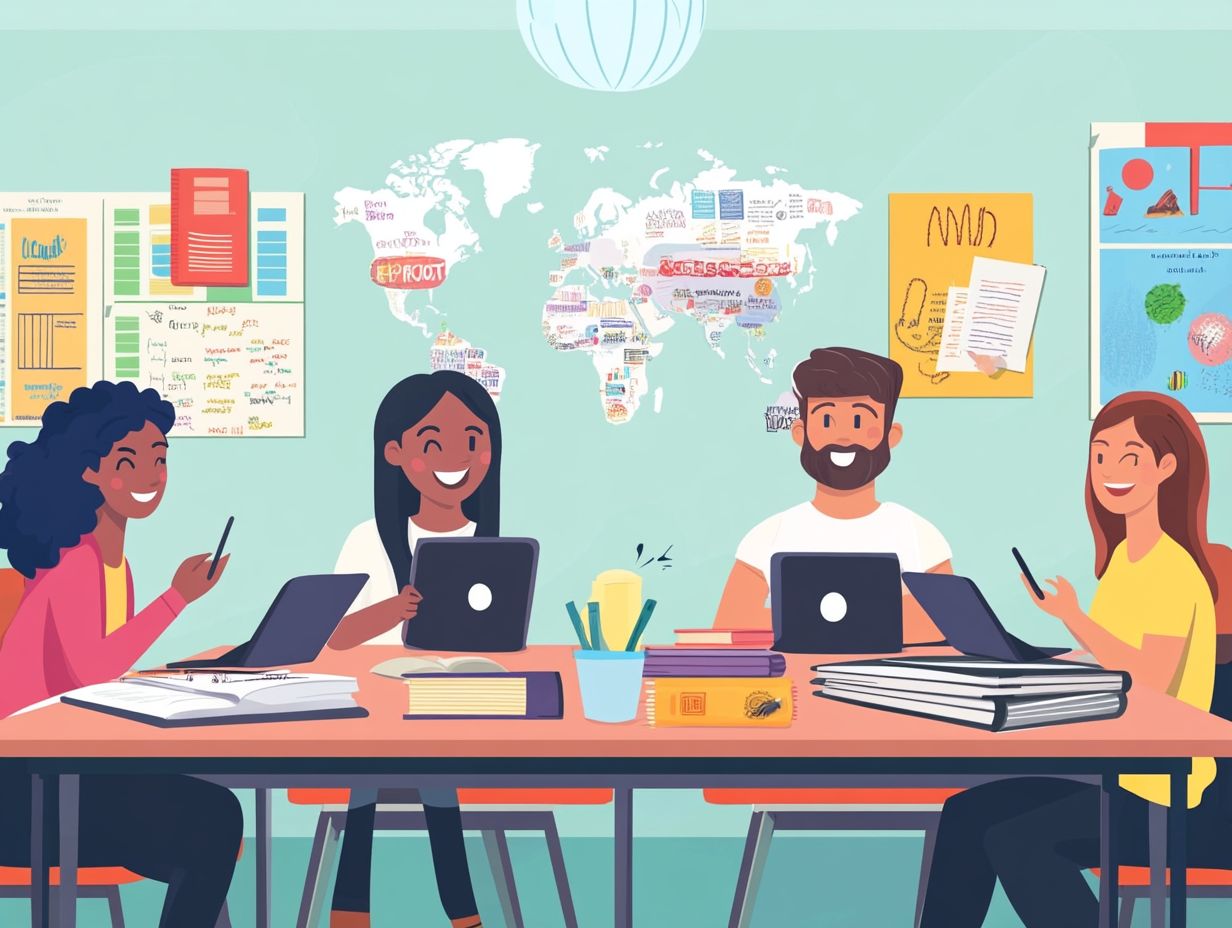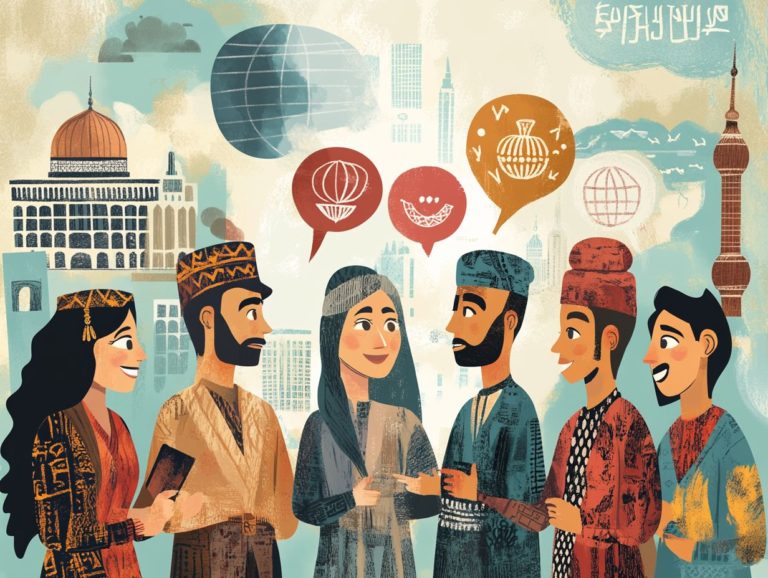5 Lessons from Polyglots: Learning Multiple Languages
Unlocking the ability to speak multiple languages can truly open doors to new cultures, career opportunities, and personal connections. This article explores five essential lessons drawn from the experiences of successful polyglots. You ll discover the significance of consistency and immersion, as well as how embracing mistakes can be an integral part of your learning journey. Jump in now and discover how you can start this exciting journey today!
Contents
- Key Takeaways:
- 1. Consistency is Key
- 2. Immersion is Essential
- 3. Don’t Be Afraid to Make Mistakes
- 4. Practice, Practice, Practice
- 5. Find Your Motivation
- How Do Polyglots Manage to Learn Multiple Languages?
- Frequently Asked Questions
- What are the top 5 lessons from polyglots for learning multiple languages?
- How can immersing yourself in a language help with language learning?
- Why is consistency important in language learning?
- How can learning grammar rules improve language learning?
- What are some examples of authentic resources that can aid in language learning?
- How can setting achievable goals help in language learning?
Key Takeaways:

- Consistency is crucial in learning multiple languages; dedicate a set amount of time daily to practice.
- Immersion is key; surround yourself with the language by traveling or finding native speakers.
- Don’t fear making mistakes; they are a necessary part of the learning process.
1. Consistency is Key
In your language learning journey, consistency stands out as a crucial element that can significantly elevate your ability to master multiple languages. It cultivates the habit of regular practice, nurturing a growing sense of confidence within yourself over time.
Committing to a specific time each day for study, even if it’s just 20 to 30 minutes, lays a robust foundation for your progress. Language experts often recommend structured routines that break learning into manageable segments, facilitating gradual improvement. Techniques like spaced repetition a method for reviewing material at increasing intervals and immersive experiences are highly effective for reinforcing vocabulary and grammar.
By setting clear goals and incorporating tools such as language apps or engaging media, you can not only sustain your interest but also ensure that your skills evolve rapidly over time.
2. Immersion is Essential
Immersion is vital for achieving fluency in multiple languages, as it allows you to engage deeply with the language, culture, and context, enriching your language learning journey. Employing effective immersion strategies can truly elevate your language acquisition process.
For example, immersing yourself in media in the target language like films, podcasts, or books helps you become familiar with various accents, vocabulary, and colloquial expressions. Participating in language exchange programs offers the chance for real-life conversations that are not only practical but also enjoyable. By choosing engaging learning materials that resonate with your interests, you can keep your motivation high and deepen your understanding.
Overcoming mental barriers, like anxiety about speaking, can make your language learning journey more enjoyable and boost your confidence, paving the way for seamless communication.
3. Don’t Be Afraid to Make Mistakes
One of the most valuable lessons you can learn on your language journey is that making mistakes is a natural part of the process. Embracing these missteps can lead to significant improvement and growth.
This mindset is crucial not only in language acquisition but in any endeavor where new skills are being developed. By viewing mistakes as stepping stones rather than setbacks, you foster resilience, allowing yourself to experiment and engage without fear.
To cultivate this attitude, practicing speaking regularly in low-pressure environments, such as language exchange meetups or online conversation clubs, can be incredibly beneficial. Techniques like deep breathing and positive visualization can effectively combat anxiety before you speak.
Renowned polyglots, such as Steve Kaufmann, emphasize how reframing one’s perspective on errors can be transformative. He often reiterates that every misstep is an opportunity to enhance your proficiency, echoing the sentiment that the journey is just as important as the destination.
Ready to start learning? Let’s get going!
4. Practice, Practice, Practice

Consistent practice is essential on your journey to mastering multiple languages. It not only reinforces your knowledge but also helps you develop the skills needed to communicate effectively and confidently in your target languages.
This ongoing engagement cements vocabulary and grammar rules. It also deepens your understanding of cultural nuances. Exploring different methods for practicing your language skills can significantly enhance your learning experience.
Make it a priority every day to practice your speaking, listening, reading, and writing! This well-rounded approach will help you see amazing progress!
Embrace the ‘avoid zero days’ philosophy. Weave small, manageable activities into your daily routine like listening to podcasts during your commute or jotting down short journal entries.
Having a tangible emotional reason like connecting with local communities or traveling can ignite your motivation. This makes each practice session not just productive but genuinely rewarding.
5. Find Your Motivation
Finding your motivation is essential for sustaining your language learning journey. A powerful emotional reason can propel you through challenges and keep you dedicated to your studies.
Reflect on what genuinely inspires your pursuit of linguistic skills. Whether it s the allure of exploring distant lands, the ambition to ascend the corporate ladder, or a desire to immerse yourself in rich cultural experiences, know what drives you.
To leverage this motivation effectively, set clear, achievable goals that resonate with your personal reasons. Schedule regular study sessions or engage with native speakers to incorporate language practice into your daily life. Start using this approach today to supercharge your language learning!
Balancing your studies with leisure activities is crucial to keeping your motivation high. This helps you avoid burnout and fosters a deeper appreciation for both the language and the culture you re embracing.
How Do Polyglots Manage to Learn Multiple Languages?
Polyglots utilize a wealth of effective techniques and methods to master multiple languages. This lifelong journey is never truly complete, and their approach can serve as a beacon of inspiration for aspiring language learners like you. For those looking to enhance their skills, consider these 5 tips for staying engaged in language learning.
By embracing fully engaging experiences, creating personalized study plans, and exploring innovative resources, these seasoned language enthusiasts navigate the intricacies of acquiring new languages with remarkable agility. While you might find success through dedicated practice and conversation exchanges, others could thrive using visual aids or auditory tools.
Adaptability is crucial in your quest for fluency. It enables you to uncover what resonates uniquely with your learning style. This rich tapestry of learning methods highlights that the path to mastering a new language is full of countless opportunities for growth and enrichment.
What Are the Benefits of Being a Polyglot?
Being a polyglot brings a wealth of advantages, from cognitive boosts to enriched career prospects. Fluency in multiple languages transforms into a remarkable asset in today s interconnected world.
The benefits go far beyond mere communication. They enhance your problem-solving skills and unlock greater creativity as you navigate through diverse linguistic frameworks. Delving into various languages offers profound cultural insights, unveiling the subtleties of traditions, social norms, and worldviews that shape different communities. This exploration fosters empathy and broadens your perspective.
In a competitive job market, being multilingual can truly set you apart. Employers increasingly seek candidates who can connect with a diverse array of clients and partners. To fully leverage these benefits, it s crucial to engage actively in your language learning journey by:
- Practicing conversations with native speakers,
- Consuming multimedia content in your target language, and
- Immersing yourself in cultural experiences.
By doing so, you can seamlessly integrate these new skills into your daily life and make the most of them.
What Are the Common Challenges Faced by Polyglots?

Polyglots often face challenges like time management and maintaining fluency. They also deal with mental barriers that can slow their language learning.
These issues can worsen due to confusion between languages. Tight schedules make regular practice feel nearly impossible.
It s not uncommon to experience dips in motivation, leading to frustration and a sense of stagnation. To effectively tackle these challenges, establish a well-structured study routine.
Include short, daily practice sessions, as this can be incredibly helpful. Seek out engaging resources, like podcasts or language exchange partners, to keep your enthusiasm alive.
Set realistic goals to keep your motivation strong and celebrate small milestones. This can make your pursuit of multilingualism enjoyable and rewarding.
How Can One Incorporate Multiple Languages into Their Daily Life?
Incorporating multiple languages into your daily life can be a fun and easy adventure with a few practical strategies. This makes your language learning journey enjoyable and motivating.
One effective approach is to create a structured daily routine. Set aside dedicated time for reading books or articles in your target language.
This not only enhances your comprehension but also enriches your vocabulary. Watching films or series featuring native speakers provides invaluable context.
Engaging in conversations with native speakers whether in person or through language exchange apps offers real-life practice that solidifies your understanding and boosts your confidence.
Opt for materials that resonate with your personal interests, such as hobbies or favorite genres. This transforms learning from a mundane task into an exciting adventure.
What Are the Most Efficient Methods for Learning a New Language?
Mastering a new language efficiently requires you to employ various methods endorsed by language experts. This significantly enhances both the speed and quality of your language acquisition.
Consider immersing yourself in experiences where daily communication is a necessity. Pair this with the scientifically backed technique of spaced repetition to reinforce your memory over time.
Engaging with native speakers through conversation exchanges or online platforms can elevate your conversational skills and deepen your cultural understanding.
Success stories from language-learning applications like Duolingo and MosaLingua highlight the power of gamification and interactive lessons. These can keep learners motivated and on track.
By combining diverse approaches, you can cultivate a well-rounded skill set that accelerates your journey toward fluency.
Can Anyone Become a Polyglot? What Are the Limitations?
While anyone can embark on the journey to becoming a polyglot, certain factors may influence your experience. Strong motivation is an essential ingredient for success.
Age is a significant factor; younger learners often find it easier to absorb new languages due to the brain’s remarkable plasticity. Your time commitment also plays a crucial role; those who carve out regular, focused practice sessions are likely to see faster progress.
Individual learning styles can greatly affect effectiveness some might thrive in immersive environments, while others may glean more from structured study.
Despite these challenges, with robust dedication and a passionate drive, you can navigate your unique language-learning adventure. Transform obstacles into stepping stones and pave your way to fluency.
Frequently Asked Questions

What are the top 5 lessons from polyglots for learning multiple languages?
Here are the top five lessons from polyglots: Immerse yourself in the language. Practice consistently, learn grammar rules, use authentic resources, and discover the advantages of learning multiple languages. Set achievable goals.
How can immersing yourself in a language help with language learning?
Immersing yourself in a language means surrounding yourself with it in your daily life. Watch movies, read books, or speak with native speakers to become more familiar with its nuances.
Why is consistency important in language learning?
Consistency is crucial because language skills need regular practice to develop. Practicing a little every day is more effective than cramming information sporadically.
How can learning grammar rules improve language learning?
Understanding grammar rules helps you grasp the language’s structure. This knowledge makes it easier to learn new vocabulary and form correct sentences.
What are some examples of authentic resources that can aid in language learning?
Authentic resources are materials made for native speakers, like newspapers, TV shows, and social media. They expose you to how the language is used naturally and provide cultural context.
How can setting achievable goals help in language learning?
Set achievable goals to keep your motivation high and focus sharp on your language journey! These goals help you track your progress and celebrate small wins, making learning enjoyable and rewarding.






